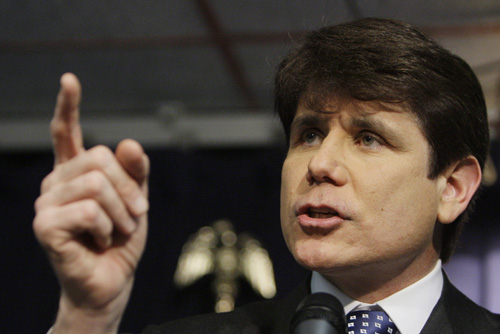Blagojevich trial begins

Illinois Gov. Rod Blagojevich makes a statement at a news conference Friday, in Chicago, as the Illinois Senate prepares for a trial that could remove him from office. M. Spencer Green, The Associated Press
Jan 26, 2009
Last updated on May 13, 2016 at 07:04 p.m.
The Illinois State Senate is scheduled to commence an unprecedented impeachment trial of Gov. Rod Blagojevich at noon in Springfield.
Inside the chambers of the Illinois Senate, state Chief Justice Thomas Fitzgerald will preside over the trial as House prosecutors attempt to convince at least 40 state senators to convict the governor on impeachment charges and immediately remove him from office. Such a vote would enable Lt. Gov. Patrick Quinn to become the state’s 41st governor following his oath of office.
Blagojevich’s Dec. 9 arrest followed U.S. Attorney Patrick Fitzgerald’s allegations of the governor’s unswerving attempts to breach ethic policies and use political power to his advantage. The Senate trial is the beginning of a new chapter in the series of events concerning the governor since his arrest.
According to a Glengariff Group poll conducted in December 2008 following his arrest, Blagojevich received a dismal approval rating of 7 percent. While there has been public outcry for his resignation, the governor has not faltered in his claim to innocence.
Get The Daily Illini in your inbox!
“They have to be accountable to the public,” Institute of Government and Public Affairs expert Christopher Z. Mooney said about the Senate. “That’s one of the reasons why they are being so careful about setting procedures and offering opportunities for the governor to participate. They understand this is a public and political activity. With the Obama connection, they know people are watching.”
In a memo issued to senators from Senate President John J. Cullerton and Senate Republican Leader Christine Radogno, senators are asked to adhere to decorum by not bringing food to their desks and using their computers only “in connection with the impeachment trial proceedings.”
Illinois history lacks a historic oar to steer a Senate trial convicting the governor. Yet, the 96th Illinois General Assembly adopted a 32-page report declaring the rules and guidelines to fairly try Blagojevich.
The rules gave Blagojevich an opportunity to challenge whether the level of evidence amassed is enough for impeachment, but he failed to file any claims by the deadline last Tuesday. The governor also failed to file requests to seek witnesses, documents or other material to be used in his defense by deadline.
Nevertheless, the governor is vehemently denouncing the trial as “unconstitutional.”
“The principle of whether I stay in office or not is far, far less important than the broader principles of protecting our Constitution and protecting the rights of individuals – the rights of individuals accused falsely or not so falsely to give them a chance to be able to have their day and protect themselves and let the truth decide what in fact is the truth,” Blagojevich said in Chicago last Friday.
The governor is not expected to attend the trial, and instead, will participate in a media juggernaut to demand his innocence.
For state Rep. Naomi Jakobsson, D-103, the media attention regarding Blagojevich is a moot condition to determine his ability to lead the state effectively.
“I don’t think it hurt his ability to lead because he hasn’t been leading,” Jakobsson said.
University trustee David Dorris called his interactions with the governor “unusual,” “trivial” and “superficial.”
A successful removal from office would create a more transparent partnership between the University and the governor’s office, Dorris said.
If convicted, senators may then also conduct a second roll call to ban the impeached governor from ever holding a public office in Illinois. This would ultimately nail Blagojevich’s political coffin shut.
In addition, any attempt by Blagojevich to appeal an impeachment conviction will simultaneously hit a dead-end according to the Illinois Constitution.
Blagojevich is just the latest of multiple Illinois politicians to be accused of corruption and irresponsibility.
Kent Redfield, an Institute of Government and Public Affairs expert on political ethics, noted the regularity of political degradation in Illinois, making the state synonymous with corruption.
“If the governor goes to jail, he will be the fourth out of the last eight governors to do so, assuming he will be formally indicted,” Redfield said.
“There is something more here than just Blagojevich and (former governor) Ryan. It’s a political culture that looks at politics as a business rather than an opportunity to promote public interest.”





